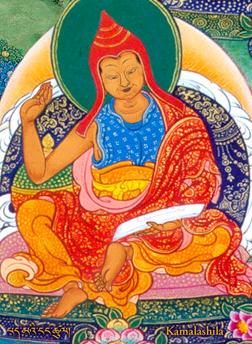Kamalashila: Difference between revisions
Jump to navigation
Jump to search
No edit summary |
No edit summary |
||
| Line 1: | Line 1: | ||
This master was the main disciple of the great abbot [[Shantarakshita]]. He famously defeated a Chinese master of the [[Hashang]] school (whose personal name is sometimes given as Mahayana Hashang) in the great debate at [[Samyé]], which took place around 846 AD, thereby ensuring that the Tibetans followed the Indian tradition of [[Madhyamika]] which had flourished at the great [[Nalanda]] monastery. His most famous compositions are the three texts entitled ''[[The Stages of Meditation]]'', which HH the [[Dalai Lama]] has taught on several times. | [[Image:Kamalashila.JPG|frame|]]This master was the main disciple of the great abbot [[Shantarakshita]]. He famously defeated a Chinese master of the [[Hashang]] school (whose personal name is sometimes given as Mahayana Hashang) in the great debate at [[Samyé]], which took place around 846 AD, thereby ensuring that the Tibetans followed the Indian tradition of [[Madhyamika]] which had flourished at the great [[Nalanda]] monastery. His most famous compositions are the three texts entitled ''[[The Stages of Meditation]]'', which HH the [[Dalai Lama]] has taught on several times. | ||
[[Category:Historical Masters]] | [[Category:Historical Masters]] | ||
[[Category:Seventeen Nalanda Masters]] | [[Category:Seventeen Nalanda Masters]] | ||
Revision as of 15:29, 13 December 2006

This master was the main disciple of the great abbot Shantarakshita. He famously defeated a Chinese master of the Hashang school (whose personal name is sometimes given as Mahayana Hashang) in the great debate at Samyé, which took place around 846 AD, thereby ensuring that the Tibetans followed the Indian tradition of Madhyamika which had flourished at the great Nalanda monastery. His most famous compositions are the three texts entitled The Stages of Meditation, which HH the Dalai Lama has taught on several times.